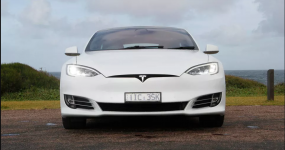“It’s a pretty good effort given the challenging market,” Chief Executive Officer Robert MacLeod said in an interview Thursday after the London-based company reported a 5 percent decline in pretax profit and reiterated an annual goal for growth.
Johnson Matthey Plc’s annual profit beat forecasts as the world’s largest supplier of catalysts for reducing truck pollution benefited from cost savings and growing demand from European carmakers for materials that cut exhaust emissions.
Shares rose 4 percent to 2,941 pence at 3:48 p.m. in London. They have slid 20 percent in the past 12 months, valuing the company at about 5.6 billion pounds ($8.1 billion), compared with an 11 percent decline in the benchmark FTSE 100 index.
The CEO is looking to diversify Johnson Matthey’s portfolio to lessen dependence on the auto industry. The maker of chemicals and battery materials stands to gain from tougher environmental rules on exhaust fumes in the European Union and an increased use of catalysts to remove pollutants.
“We’re spending a lot of time investing in other businesses” to move beyond emission control technologies for car exhausts, MacLeod said in the interview. “The message is getting through about where we are going strategically.”
Water Treatment
MacLeod said he wants to make acquisitions in areas such as water treatment, although high valuations and a lack of availability of assets are hindering factors. Johnson Matthey had a cash inflow of about 860 million pounds in the fiscal year ended March.
While Johnson Matthey has suffered from a subdued truck market in the U.S., registrations of new trucks in Europe jumped 22 percent in April, according to the European Automobile Manufacturers Association in Brussels. MacLeod said he sees indications that a slide in demand in the heavy truck market could now stabilize in the second half.
The company is part way through a program to reduce costs by about 34 million pounds a year.
Pretax profit declined 5 percent to 418.2 million pounds, the company said Thursday in a statement. This compared with an average forecast of 415 million pounds by analysts surveyed by Bloomberg. Sales gained 7 percent to 10.7 billion pounds and the company reiterated a forecast for profit growth in the current financial year through March.
Before it’s here, it’s on the Bloomberg Terminal.









Recent Comments